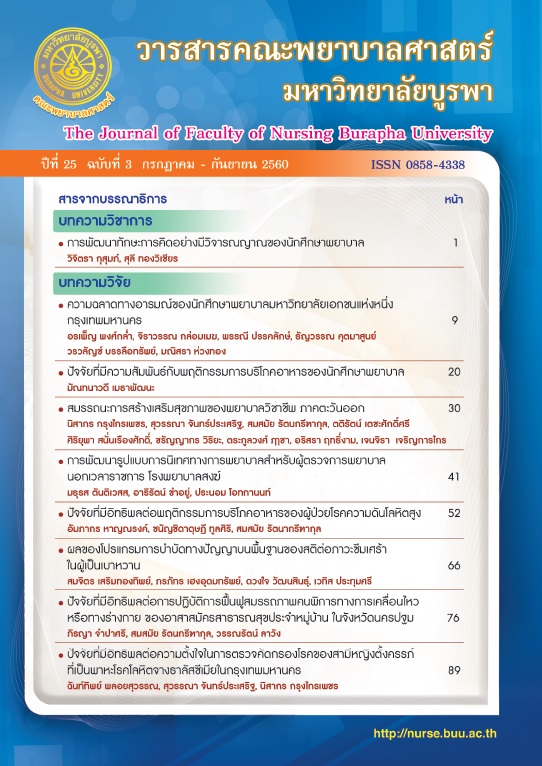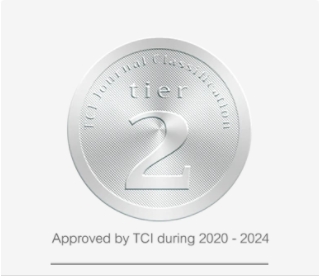ผลของโปรแกรมการบำบัดทางปัญญาบนพื้นฐานของสติ ต่อภาวะซึมเศร้าในผู้เป็นเบาหวาน
คำสำคัญ:
ภาวะซึมเศร้าผู้เป็นเบาหวาน, โปรแกรมการบำบัดทางปัญญาบนพื้นฐานของสติ, Depression, persons with diabetes, mindfulness-based cognitive therapyบทคัดย่อ
การวิจัยแบบกึ่งทดลองนี้มีวัตถุประสงค์เพื่อศึกษาผลของโปรแกรมการบำบัดทางปัญญาบนพื้นฐานของสติแบบกลุ่มต่อภาวะซึมเศร้าของผู้เป็นเบาหวานกลุ่มตัวอย่างเป็นผู้เป็นเบาหวานที่มีภาวะซึมเศร้าในระดับเล็กน้อยถึงระดับปานกลาง โดยมีคุณสมบัติตามเกณฑ์ที่งานวิจัยกำหนด จำนวน24 คน สุ่มตัวอย่างเข้ากลุ่มทดลองและกลุ่มควบคุม กลุ่มละ 12 คน กลุ่มทดลองได้รับโปรแกรมการบำบัดทางปัญญาบนพื้นฐานของสติกลุ่มควบคุมได้รับการพยาบาลตามปกติ ประเมินภาวะซึมเศร้าโดยใช้แบบวัดภาวะซึมเศร้าของเบค ได้ค่าความเที่ยงเท่ากับ .83 วิเคราะห์ข้อมูลโดยใช้สถิติเชิงพรรณนา ความถี่ ร้อยละ ค่าเฉลี่ย ส่วนเบี่ยงเบนมาตรฐาน วิเคราะห์ความแปรปรวนแบบวัดซ้ำและการทดสอบรายคู่ด้วยวิธีบอนเฟอร์โรนี
ผลการวิจัยพบว่า กลุ่มทดลองมีคะแนนเฉลี่ยภาวะซึมเศร้าในระยะหลังการทดลองเสร็จสิ้น และระยะติดตามผลแตกต่างจากกลุ่มควบคุมอย่างมีนัยสำคัญทางสถิติที่ระดับ .001 และกลุ่มทดลองมีคะแนนเฉลี่ยภาวะซึมเศร้าหลังการทดลองเสร็จสิ้นทันทีและระยะติดตามผล 1 เดือน ต่ำกว่าก่อนการทดลอง อย่างมีนัยสำคัญทางสถิติที่ระดับ .001 โปรแกรมการบำบัดทางปัญญาบนพื้นฐานของสติแบบกลุ่มนี้ ช่วยลดภาวะซึมเศร้าในผู้เป็นเบาหวาน ดังนั้นบุคลากรด้านสุขภาพ สามารถนำโปรแกรมฯไปประยุกต์ใช้เพื่อลดภาวะซึมเศร้าในผู้เป็นเบาหวานเพื่อการมีสุขภาพจิตและคุณภาพชีวิตที่ดี
Abstract
The purpose of this study was to examine the effect of group mindfulness-based cognitive therapy program on depression among persons with diabetes who had mild to moderate depressive levels. The sample consisted of 24persons with diabetes who met the inclusion criteria. They were randomly assigned into either experimental or control groups
(n = 12 in each group). Persons with diabetes in the experimental group participated in the mindfulness based-cognitive therapy program. Whereas the persons with diabetes in the control group received only routine care from the same setting. Thai version of Beck’s depression scale was used to measure depression. This scale yielded Cronbach's alpha reliability of .83. Descriptive statistics using frequency, percentage, means, standard deviation, repeated measure ANOVA, and Bonferroni method for testing comparison were employed to analyze the data.
The results revealed that the mean scores of depression at post-test and one-month follow-up phases in the experimental group were significantly different from the control group (p < .001). In the experimental group, the mean scores of depression at post-test and 1 month follow-up phase were also lower than at pre-test (p < .001).
Mindfulness-based cognitive therapy program in this study effectively reduced depression among persons with diabetes. Therefore, nurses and related health care providers could apply this program in order to promote mental health and enhance quality of life among these persons.





